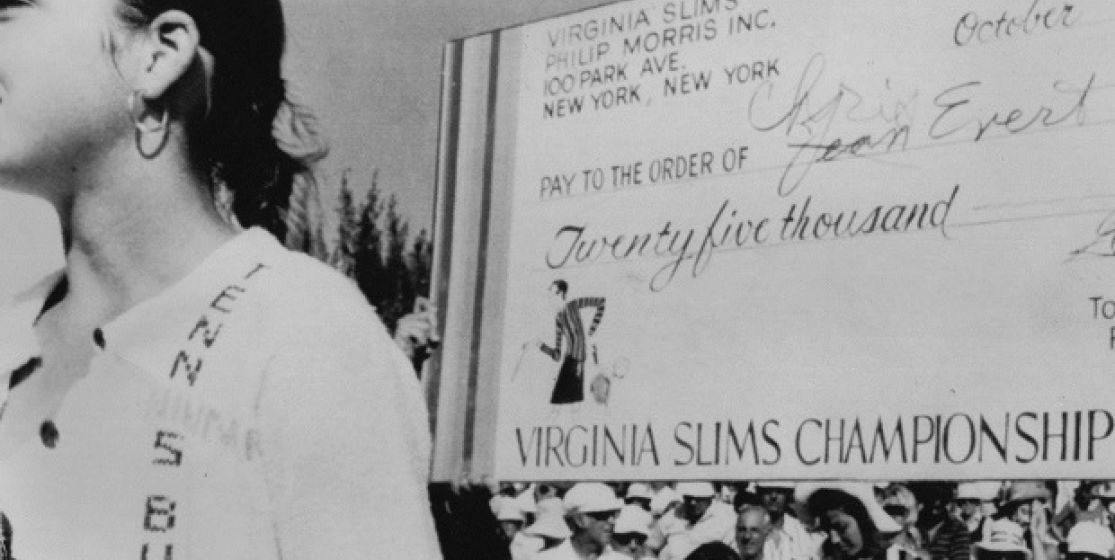If today BNP Paribas is the sponsor of the WTA Finals, it hasn’t always been the case. Until the early 90s, the tournament was sponsored by a major tobacco company. Sport and cigarettes, the surprising union of a bygone era. For better and mostly for worse...
On the poster of the BNP Paribas WTA Finals 2014, organized in Singapore from October 17th to 26th, the string of contenders for the final victory is put forward, led by the defending champion and favourite, Serena Williams, racquet in one hand and clenched fist in the other. Going back thirty years ago, the poster promoting the same event was significantly different. It featured an anonymous player wearing skirt, sporty, elegant, smiling, standing there with a racquet in one hand and in the other... a cigarette.
.jpg)
Today, the image seems somewhat surprising, even shocking. But at the time, it went almost unnoticed. In all Western countries, smoking was everywhere. Until the 80s and the arrival of the first anti-smoking laws. It was allowed to smoke everywhere: in public buildings, in restaurants, on airplanes and even in sports arenas. The advertising agencies of tobacco companies could give free rein to their imagination, including the use of major sports competitions for their promotional campaigns. If motor sports were particularly favoured because of their manly side, other disciplines could also serve as a support to advertise tobacco companies. This was the case of women's tennis, which benefited from an unexpected financial windfall from Philip Morris, from the beginning of the Women's Tennis Association (WTA) in 1970. It was only natural that two years later, while the first edition of the WTA finals was organized in Boca Raton, Florida, the large American firm decided to become the main sponsor of the competition. The tournament was then named "Virginia Slims Championships", after a brand of cigarettes manufactured by Philip Morris and designed specifically for women.
"You’ve come a long way, baby"
The packs of Virginia Slims emerged on the American market in 1968. The target? Young women in search of freedom and elegance. Their slogan was also explicit: "You've come a long way, baby." It was a way of saying to the young ladies of the new generation that women's emancipation was the result of a long process and that the fact that they were now able to smoke like men was an achievement. As an advertising medium, the WTA finals were perfectly suited to the image that the "Mad Men" in charge of advertising at Philip Morris wanted for the brand. Women's tennis had earned its freedom by creating a professional league. The WTA was the counterpart of ATP, but more glamorous. From the 1970s to the early 90s, women's tennis and the cigarette brand for women will live a reasoned romance. If the instances of the WTA never complained, it was that because they were receiving a big check from the tobacco company that, in addition to sponsoring the Masters, was also sponsoring several tournaments in the United States, in Boston, Houston, Newport, Indianapolis... But the tarps promoting the Virginia Slims on the sides of the courts weren't to the taste of everybody. Regularly, anti-tobacco associations were coming to disrupt the tournament. The first years, it was held outdoors in Florida and Los Angeles, and planes were flying in the sky during games, carrying hostile messages. Then from the late 70s, when the final was relocated at the Madison Square Garden in New York, critics started to get louder.
Billie Jean King endorsed it in the name of "freedom of choice"
The vehemence mainly came from the GASP (Group Against Smoking Pollution, ed), whose members didn't hesitate to call upon the players and get them to take responsibilities. This was particularly the case in 1983, when Billie Jean King was heckled on the sidelines of the tournament "The Virginia Slims of Boston" by the president of the GASP, Rita Addison. She went so far as to talk about "prostitution" to the militant champion, then at the end of her career. Accusations to which she answered: "I believe in freedom of choice. It is up to women themselves to decide it they want to smoke or not. The most important is to be well informed on the subject and to make our own decisions." 10 years later, in 1993, The Times columnist Bob Herbert took advantage of the tournament at the Madison Square Garden to call upon the world of women's tennis once again, and Billie Jean King in particular, about their indirect endorsement to the tobacco industry. "No player of the tournament has been instructed by Philip Morris to smoke, to appear in an advertisement or to endorse smoking" tried to defend the one who was at the time captain of Team USA in the Fed Cup. But critics started to become too intense for the tobacco company, which stopped to sponsor the WTA from the following year. And that's how the tormented relationship between women's tennis and tobacco finally ended: by an inevitable divorce.






